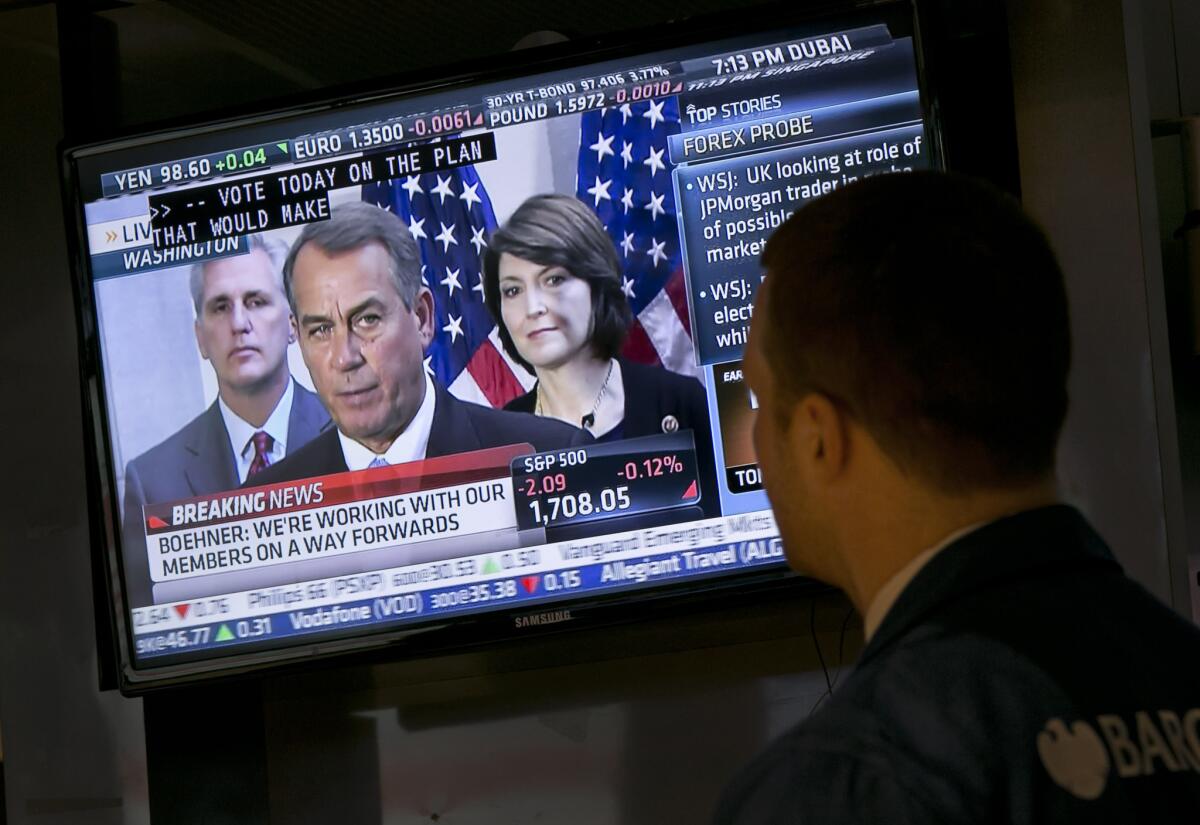Children of the House

- Share via
Washington’s latest fiscal crisis appeared to be coming to an end Tuesday morning as leaders of the two parties in the Senate neared agreement on a plan to reopen the government and lift the debt limit until early next year. But then House Republicans — who triggered the crisis in the first place by trying to defund or delay the 2010 healthcare law — decided to prolong the fight. As a result, lawmakers may not raise the federal debt limit in time to pay all of Washington’s bills. Investors, who had already been dumping short-term Treasury bonds, started selling off stocks too in an early sign of the panic that could come if House GOP leaders keep indulging the least responsible members of their caucus.
Such brinkmanship has grown familiar over the last 2 1/2 years, and the outcome of the current episode long seemed preordained. By the time lawmakers started work in September on a stopgap spending bill for the fiscal year beginning Oct. 1, it was too late to negotiate any meaningful changes in policy. The only rational path was to maintain the budgetary status quo — which neither side likes — while lawmakers try again to reconcile their ideologically driven differences over spending, taxes and entitlements.
That’s been the Democrats’ position throughout. A group of roughly 50 tea party-affiliated House Republicans, however, has refused to support reopening the government or raising the debt limit unless it can extract some measure of flesh from Obamacare. And House Speaker John A. Boehner (R-Ohio) has let them call the tune.
By Tuesday, House Republicans were reduced to just trying to embarrass Senate Democrats with a petty tweak to the 2010 law. Their leaders circulated a proposal to reopen the government for two months and lift the debt limit until Feb. 7, but also to amend the Affordable Care Act to in effect cut the pay of lawmakers, their staffs and White House political appointees by eliminating the federal contribution to their insurance premiums. Now that’s an important policy goal. The proposal also would have made it harder for the Treasury to keep paying the bills after Feb. 7. The tea party wing wasn’t satisfied, however, demanding a more significant attack on Obamacare. The leadership eventually dropped the proposal, putting the onus back on Senate leaders to cut a deal.
Bear in mind that the House GOP prevailed weeks ago on the issue of how much spending to allow in the stopgap bill, and Senate Democrats agreed to wide-ranging budget negotiations months ago. Yet the House’s inability to move on puts Senate Democrats and the White House in the position of having to choose between accommodating a petulant and unreasonable GOP and risking a calamitous default. It’s as if House Republicans are counting on Democrats to be the more responsible player in this dysfunctional system.
More to Read
A cure for the common opinion
Get thought-provoking perspectives with our weekly newsletter.
You may occasionally receive promotional content from the Los Angeles Times.










